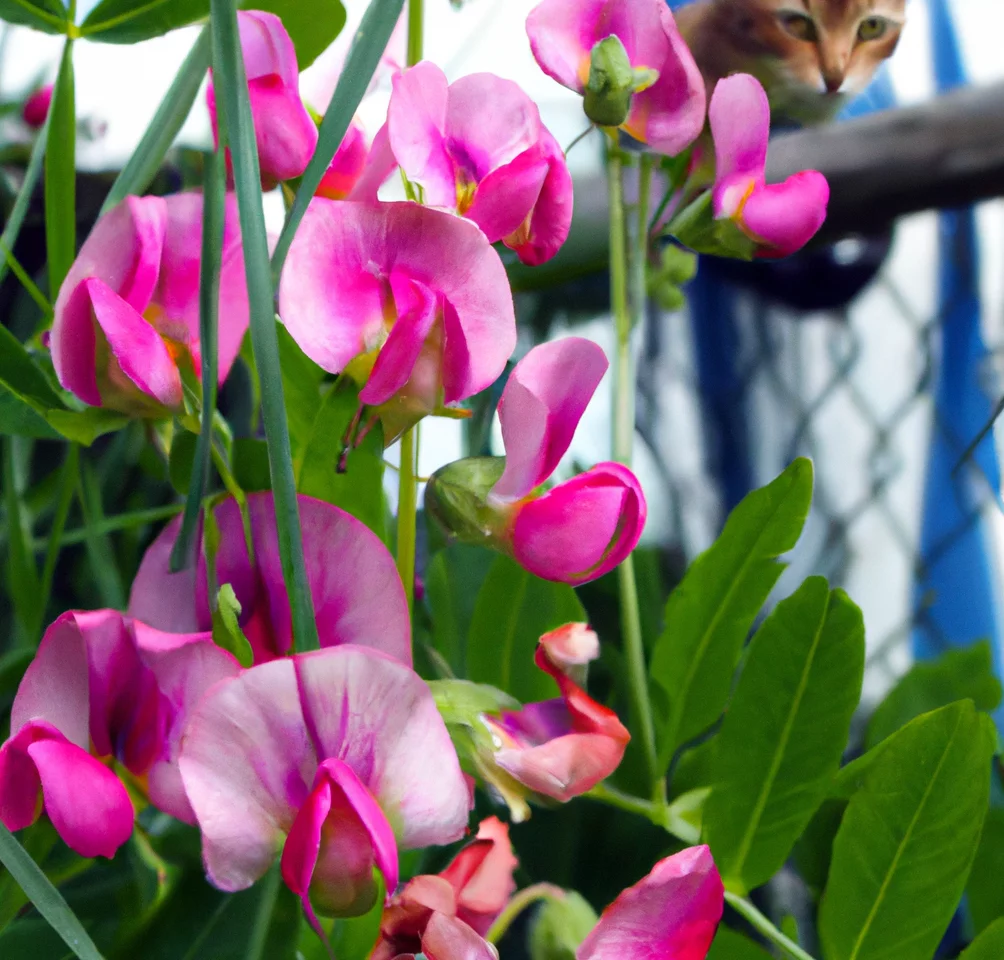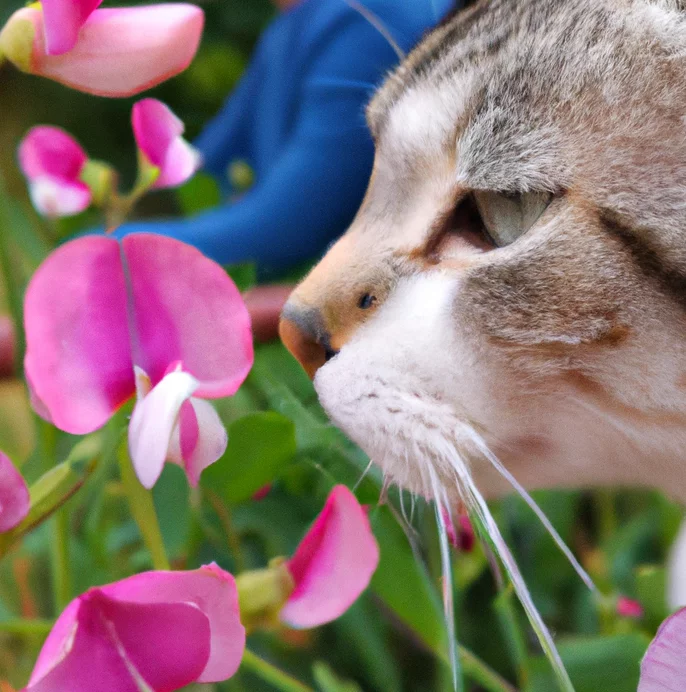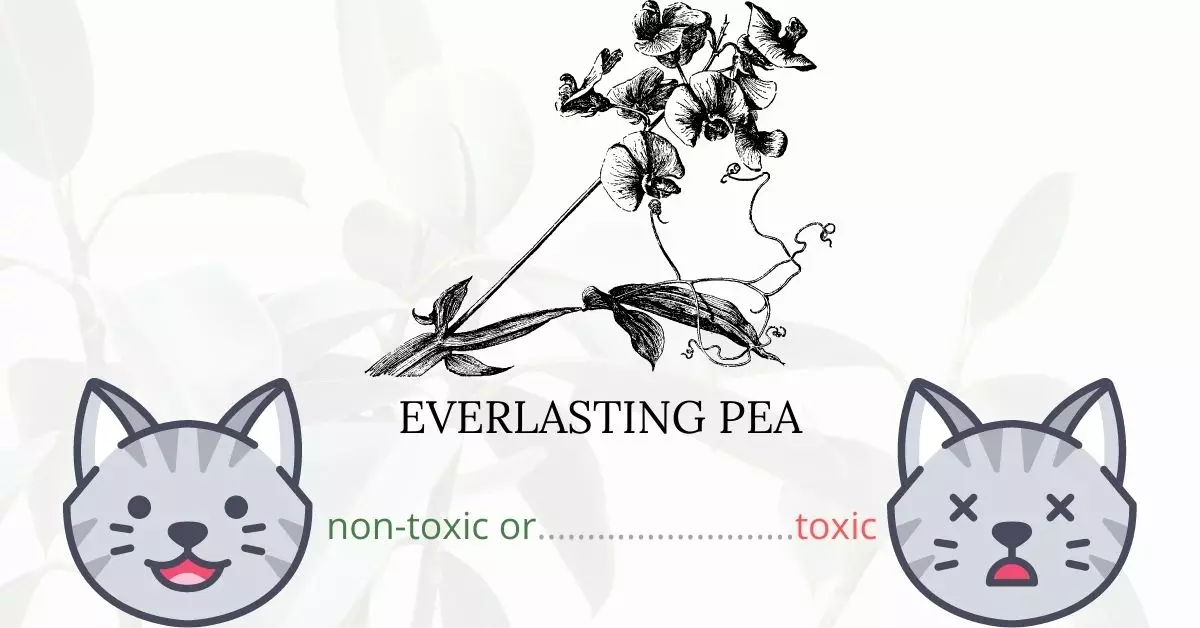Yes, Everlasting Peas are toxic to cats. The Everlasting Pea, also known as sweet pea and perennial pea, is a flowering plant that contains aminoproprionitrite, a toxic substance harmful to cats. Upon ingestion, cats can experience symptoms such as vomiting, weakness, and seizures. The toxin works in two primary ways: by inhibiting collagen synthesis, affecting the cat’s ability to repair muscles, tendons, and other fibrous tissues, and by accelerating cell death in connective tissues, including those in the heart. All parts of the Everlasting Pea plant are poisonous for cats. If a cat consumes any part of this plant, seeking immediate veterinary attention is crucial.
This article was written in collaboration with a team of experienced DVMs (doctors of veterinary medicine). Through their expertise and contributions, we ensure the accuracy and timeliness of the information provided on the potential risks of various plants, particularly the Everlasting Pea, and their effects on cats. Additionally, our research includes high-authority sources such as the ASPCA and PetMD to further validate the information presented.
Clinical Signs of Everlasting Pea Poisoning in Cats

The toxic compounds present in the Everlasting Pea can have a profound effect on a cat’s neurological system. When a cat is exposed to, or consumes parts of this plant, the following clinical signs may manifest due to the toxin’s influence on the cat’s body:
- Vomiting: This is the body’s immediate response to expel harmful substances. The presence of the toxin in the digestive system can irritate the stomach lining, leading to nausea and eventual vomiting.
- Diarrhea: Just as with vomiting, diarrhea is another way the body attempts to rid itself of harmful substances. The toxins can disturb the intestinal flora and irritate the digestive tract, causing loose stools.
- Lethargy: As the toxin interferes with the normal functioning of the cat’s body, there can be a decrease in energy levels, leading to a listless and unresponsive state.
- Excessive pacing: This behavior can be attributed to the toxin affecting the cat’s neurological system, causing restlessness and confusion.
- Tremors: The toxin’s effect on the nervous system can result in involuntary muscle contractions, leading to visible shakes or tremors.
- Seizures: In more severe cases, the disruption to the neurological system can cause erratic electrical activity in the brain, resulting in seizures.
- Sudden death: In extreme cases, the overwhelming presence of the toxin, especially if not treated promptly, can lead to vital organ failure and sudden death.
It’s essential to be aware of these clinical signs and to seek veterinary care immediately if you suspect your cat has come into contact with or ingested the Everlasting Pea. The earlier the intervention, the better the prognosis for the affected feline.
First Aid and Treatment of Everlasting Pea Poisoning in Cats

Plant poisoning is frequently treated with supportive intravenous fluid and nutritional therapy. To eliminate the poison from your cat’s gastrointestinal tract, your veterinarian may induce vomiting. Activated charcoal can also help your cat’s stomach absorb the poison. If your cat is vomiting frequently, your veterinarian may prescribe anti-vomiting medication. To treat seizures and other symptoms, various drugs may be recommended.
Poisoning may become a severe case if your cat has consumed large amounts of the everlasting pea or if he has consumed the plant continuously for several days. If your cat has suffered organ damage, treatment may be more intensive, depending on the symptoms your cat is manifesting.
Recovery from Everlasting Pea Poisoning in Cats

Most mild cases of everlasting pea plant poisoning have high chances of survival with symptoms fading away within 24 hours. In severe cases, full recovery depends on your cat’s general health condition prior to poisoning, the extremities of the symptoms he or she is experiencing, and how prompt he or she received veterinary treatment.
Prevention of Everlasting Pea Poisoning in Cats
Chances of exposure to everlasting pea and other toxic plants may be reduced by keeping your cats safe inside your home. Keep them occupied and engaged indoors to minimize their outdoor activities. Be a responsible cat parent by keeping yourself informed about what is dangerous to felines.
If you love plants but have cats at home, check out these lists:





